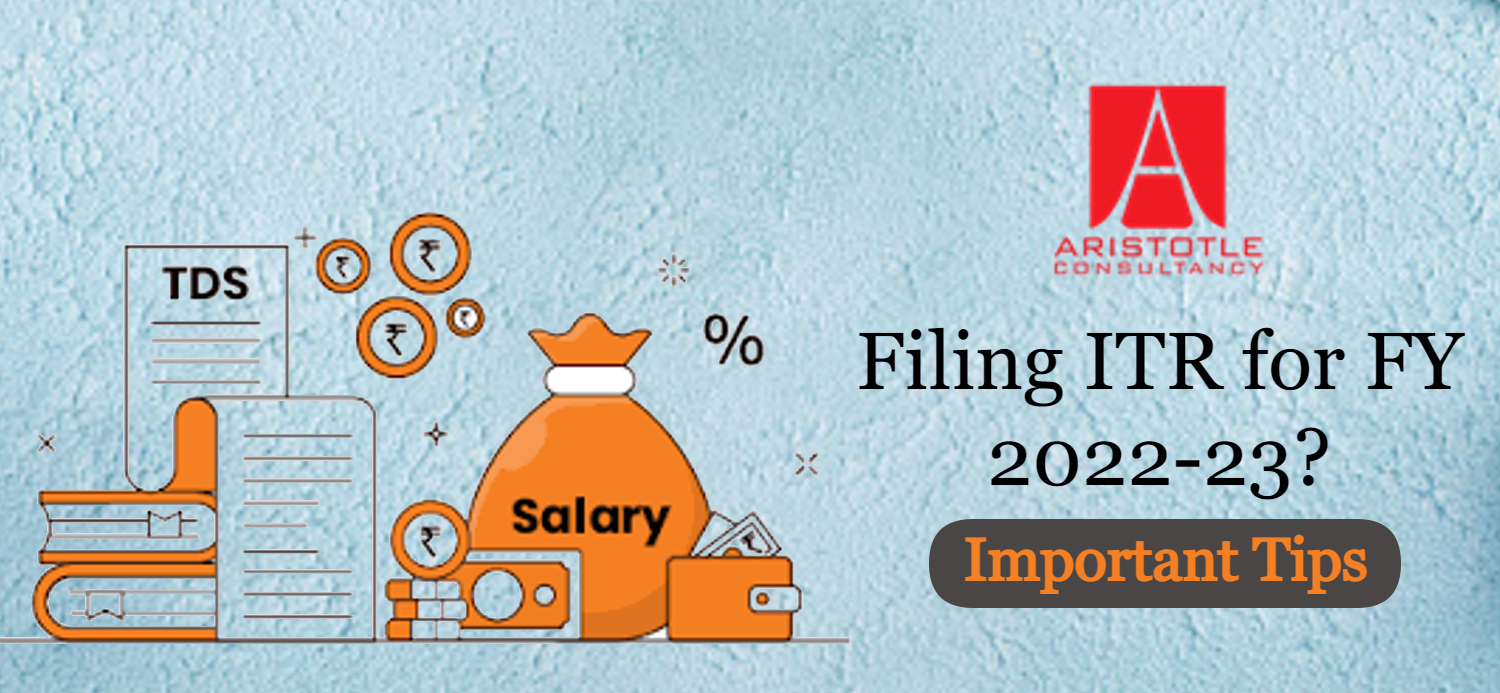Filing your Income Tax Return (ITR) is an important task that individuals and businesses need to fulfill to meet their tax obligations. It involves reporting your income, deductions, and tax liabilities to the tax authorities. In this guide, we will provide you with important tips and information on filing your ITR for the financial year (FY) 2022-23.
1. Understand the Financial Year and Assessment Year:
Before we delve into the details of filing your ITR, it’s crucial to understand the concept of the financial year and assessment year. The financial year is the year in which you earn income, while the assessment year is the year immediately following the financial year in which you file your tax return.
For example, for FY 2022-23, the assessment year would be 2023-24. It’s important to keep this distinction in mind when filing your ITR.
2. Gather Relevant Documents:
To file your ITR accurately, you need to gather all the necessary documents. These may include:
a. Form 16: Form 16 is one of the most important documents for salaried individuals. It is issued by your employer and contains details of your salary, allowances, deductions, and taxes deducted at source (TDS). It helps you compute your taxable income and report it in your ITR.
b. Annual Information Statement (AIS): The AIS, also known as Form 26AS, is a consolidated statement that provides a summary of your financial transactions, such as taxes deducted, taxes paid, and other details of your income. It includes TDS deducted by your employer, banks, or any other deductors.
c. Investment and Expense Proofs: You should gather relevant investment proofs such as receipts for life insurance premium payments, contributions to provident funds, National Pension Scheme (NPS) statements, etc. Also, gather proofs of expenses eligible for deductions, like medical bills, home loan interest certificates, and donations made to eligible charities.
d. Bank Statements: Collect your bank statements for the FY 2022-23, as they can help you cross-verify your income and expenses. Having accurate records will facilitate the filing process.
e. Other Documents: Depending on your income sources, you may need additional documents, such as rental income receipts, capital gains statements, business income records, etc.
3. Choose the Appropriate ITR Form:
The Income Tax Department provides different ITR forms, each catering to specific categories of taxpayers. It’s important to choose the correct form that aligns with your income sources and nature of income. Here are some commonly used ITR forms for individuals:
a. ITR-1 (Sahaj): This form is for individuals with income from salary, one house property, other sources (excluding lottery winnings and racehorse income), and total income up to Rs. 50 lakh.
b. ITR-2: Individuals and Hindu Undivided Families (HUFs) having income from salary, house property, capital gains, or foreign assets should use this form.
c. ITR-3: This form is for individuals and HUFs who have income from business or profession.
d. ITR-4 (Sugam): It is for individuals, HUFs, and firms (other than LLP) who have opted for the presumptive taxation scheme under Section 44AD, 44ADA, or 44AE.
e. ITR-5: This form is for LLPs, Association of Persons (AOPs), Body of Individuals (BOIs), and artificial judicial persons.
f. ITR-6: Companies, other than those claiming exemption under Section 11 (income from property held for charitable or religious purposes), should use this form.
g. ITR-7: This form is for persons including companies required to furnish returns under Sections 139(4A) or 139(4B) or 139(4C) or 139(4D) (i.e., trusts, political parties, institutions, colleges, etc.).
Make sure to select the appropriate form based on your income sources and nature of income to ensure accurate reporting.
4. Compute Your Total Income:
To file your ITR, you need to compute your total income for the FY 2022-23. Here’s a general breakdown of the components to consider:
a. Income from Salary: Consider your salary, allowances, perquisites, and any other income related to your employment.
b. Income from House Property: If you own a house property, calculate the income or loss from that property after considering factors such as rent received, municipal taxes paid, and home loan interest paid.
c. Income from Capital Gains: If you have sold any assets, such as real estate or stocks, calculate your capital gains. Different types of capital gains, such as long-term and short-term, have different tax implications.
d. Income from Business or Profession: If you are self-employed or run a business, calculate your income after deducting allowable business expenses.
e. Income from Other Sources: Include income from sources like interest on savings accounts, fixed deposits, or any other income not covered by the above categories.
5. Claim Deductions and Exemptions:
The Income Tax Act provides various deductions and exemptions to reduce your taxable income. Here are some common deductions:
a. Section 80C: You can claim deductions for investments in specified schemes like Employee Provident Fund (EPF), Public Provident Fund (PPF), National Savings Certificates (NSC), tax-saving fixed deposits, life insurance premiums, and tuition fees.
b. Section 80D: Deductions can be claimed for premiums paid towards health insurance policies for yourself, your family, and parents.
c. Section 80G: Donations made to eligible charities are eligible for deductions. Ensure you have proper receipts and documentation to support your claims.
d. Section 80E: Interest paid on education loans can be claimed as a deduction.
There are several other sections under the Income Tax Act that provide deductions for specific purposes. Consult the act or seek professional advice to maximize your deductions and exemptions.
6. Report Income from Foreign Assets:
If you have any income or assets outside of India, it’s important to report them correctly in your ITR. Non-disclosure or incorrect reporting of foreign assets can lead to penalties and legal consequences.
7. Verify Your ITR:
After filling out the necessary details in the chosen ITR form, it’s essential to verify your ITR before submitting it. Verification confirms the accuracy and authenticity of the information provided. The Income Tax Department provides various methods for verifying your ITR:
a. Electronic Verification Code (EVC): This is one of the most common methods. You can generate an EVC through net banking, Aadhaar OTP, or a registered email address and mobile number.
b. Aadhaar OTP: If your mobile number is linked to your Aadhaar card, you can use Aadhaar OTP to verify your ITR.
c. Digital Signature Certificate (DSC): A DSC is an electronic form of a signature that can be used to verify your ITR.
d. Physical Verification: If you opt for physical verification, you need to print the ITR-V (Acknowledgment) form, sign it, and send it to the Centralized Processing Center (CPC) within the specified timeframe.
Make sure to choose the appropriate verification method based on your convenience and comply with the specified guidelines.
8. File within the Due Date:
The due date for filing your ITR for FY 2022-23 is typically July 31, 2023 (subject to change by the tax department). Filing within the due date is important to avoid penalties or interest on any taxes owed.
9. Seek Professional Assistance if Needed:
Filing your ITR can be a complex process, especially if you have multiple income sources or complex financial transactions. If you find it challenging or are uncertain about certain aspects, consider seeking professional help from a chartered accountant or tax consultant. They can provide guidance, ensure accurate filing, and help you maximize your tax benefits.
10. Maintain Proper Records:
After filing your ITR, it’s crucial to maintain copies of your filed returns, supporting documents, and relevant records for future reference. These documents may be required for verification, assessments, or any future inquiries by the tax authorities. Ensure you keep them in a safe and accessible place.
It’s important to note that tax laws and regulations are subject to change. Therefore, it’s advisable to consult the latest guidelines, updates, and notifications from the Income Tax Department or seek professional advice based on your specific circumstances.
Filing your ITR accurately and within the stipulated time ensures compliance with tax laws and helps you fulfill your responsibilities as a taxpayer.
Aristotle Consultancy : Get stress-free assisted ITR filing. Our Income tax experts guarantee maximum saving. Flat 10% off on ITR filing. Dedicated tax expert. On demand support. Accurate ITR filing.
Read more related blogs:
Increased Tax Exemption Limit on Leave Encashment: A Boon for Non-Government Salaried Employees
End To End Guide To Setting Up A Company In India
5 Key Financial Strategies For Small Businesses
Unlocking Business Growth: The Benefits Of Virtual Accounting Services
Types Of Outsource Financial Services That Businesses Can Choose






